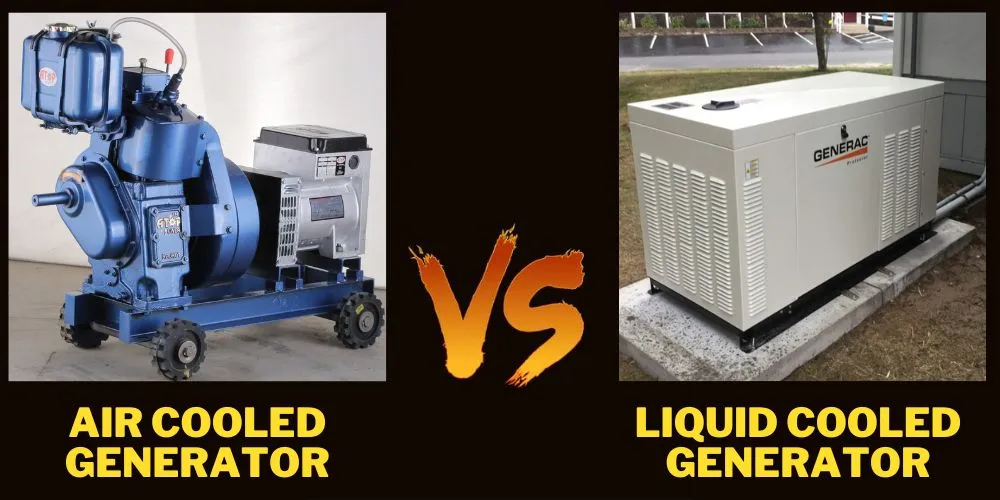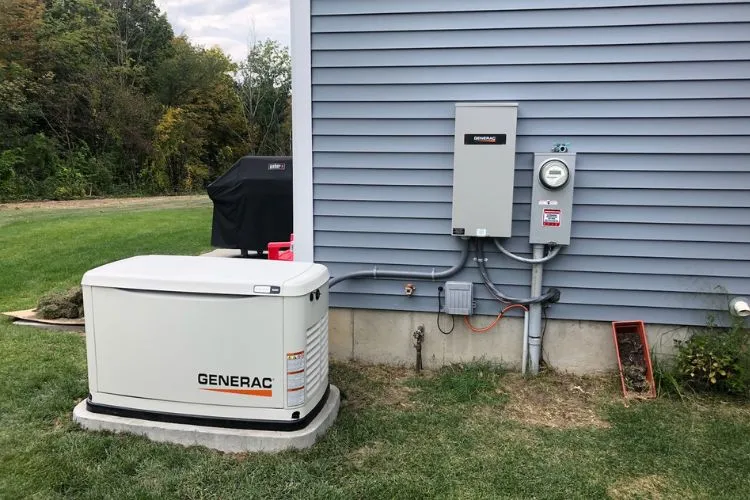Generators are essential for providing power during outages and in areas without access to the electrical grid.
They come with different cooling systems, primarily air-cooled and liquid-cooled, each with distinct features and benefits.
This air cooled vs liquid cooled generator article explores these two types of generators, helping you determine which might be better suited to your needs.

Understanding Generator Cooling Systems
Air Cooled Generators
Air-cooled generators rely on air to maintain the operating temperature of the engine. These generators have fans that force air across the engine to dissipate heat.
Common in smaller, portable generators, this system is straightforward and suitable for less demanding applications.
Liquid Cooled Generators
In contrast, liquid-cooled generators use a coolant solution, similar to car engines, to manage engine temperature.
The coolant absorbs heat from the engine and passes through a radiator where it is cooled.
This system is usually found in larger generators that handle higher power loads and continuous operation.
Air Cooled Vs Liquid Cooled Generator: Pros and Cons
Air Cooled Generators
Air-cooled generators are less complex and typically cost less than their liquid-cooled counterparts. They are easier to maintain as they have fewer components that can fail.
However, these generators are usually small and do not efficiently handle extended use, especially in warm climates where their cooling capacity can be overwhelmed.
Liquid Cooled Generators
Liquid-cooled generators are capable of running at full capacity for longer periods and can handle higher power demands.
This makes them better suited for intensive uses, such as in commercial or industrial environments. The downside is their complexity; they require more upkeep and involve higher initial and operating costs.
Air Cooled Vs Liquid Cooled Generator: Choosing the Right Generator
Selecting the right generator involves considering multiple factors. Assess the size of the area needing power and understand the total power requirements of all devices and appliances you plan to run.
Also, consider the environment: hot climates might necessitate a liquid-cooled generator for efficient performance.
Analyze not just the purchase price but also long-term operational costs. Liquid-cooled generators, while more expensive initially, may offer better value over time through greater efficiency and durability.

Maintenance and Safety Tips
Air Cooled Generators
To ensure reliability, perform regular maintenance, such as cleaning or replacing air filters and checking the integrity of the cooling fans.
It is also crucial to operate the generator in well-ventilated areas to prevent overheating.
Liquid Cooled Generators
Regular maintenance for liquid-cooled generators includes monitoring coolant levels and ensuring that the radiator and other components are free from leaks.
It is also important to check the system for any signs of corrosion or damage, which could affect performance and safety.
Innovative Trends in Generator Cooling Technologies
Technologies in generator cooling systems continue to evolve. Improved fan designs in air-cooled generators enhance airflow, making them more efficient.
For liquid-cooled systems, advances in coolant technologies, including the use of more effective, eco-friendly liquids and enhanced materials for radiators, enhance cooling efficiency and environmental sustainability.
Pro Tips
Before purchasing, consult with a professional to thoroughly assess your specific power requirements. Consider the environment in which the generator will operate, as well as the noise levels.
Make sure to understand the warranty and support available for the generator and check the availability of parts and service.
Brand and Model Comparisons
When comparing generator brands and models, Honda and Generac often stand out. Honda’s air-cooled generators, like the EU2200i, are lauded for their portability and reliability, perfect for occasional use.
Generac’s liquid-cooled models, such as the Guardian Series, are praised for their durability and capacity to handle extensive use.
While Honda offers ease of use and quiet operation, Generac provides robust power output and efficiency, making it suitable for more demanding energy needs.
Safety and Operating Guidelines
Operating generators, whether air-cooled or liquid-cooled, necessitates adherence to safety guidelines to prevent accidents, injuries, and damage. Firstly, always ensure the generator is placed in a well-ventilated area to avoid the accumulation of deadly carbon monoxide gas.
Refrain from operating generators in enclosed spaces or near windows and vents that could allow exhaust gases to enter living areas.
It is crucial to use heavy-duty, outdoor-rated power cords and keep the generator dry and protected from moisture to prevent electrical hazards.

Follow the manufacturer’s maintenance schedule to keep the generator in optimal condition, checking for leaks, wear, and ensuring all components function correctly.
Equally important, never refuel a generator while it is running; allow it to cool down to minimize the risk of fire.
Adhering to these safety and operating guidelines will help ensure a secure environment for everyone near the generator, minimizing the risks associated with its use.
User Reviews and Testimonials
User reviews and testimonials offer invaluable insights into the real-world performance of air-cooled and liquid-cooled generators.
Customers often praise the simplicity and portability of air-cooled generators for short-term use, appreciating their cost-effectiveness for occasional power outages.
Conversely, advocates for liquid-cooled models highlight their robustness and reliability during extensive usage, particularly valuing their stable operation in high-demand scenarios.
These firsthand accounts can guide potential buyers, revealing practical considerations such as ease of maintenance, noise levels, and customer service experiences with various brands, leading to informed decision-making based on actual user satisfaction and challenges.
Frequently Asked Questions (FAQs)
Which is more cost-effective in the long run, air-cooled or liquid-cooled generators?
Liquid-cooled generators generally offer better long-term cost-effectiveness, especially for continuous or heavy-duty use, despite their higher upfront costs.
Can air-cooled generators be used for industrial purposes?
Typically, air-cooled generators are not suitable for industrial purposes due to their limited power output and efficiency under heavy loads.
How often do liquid-cooled generators need maintenance?
Liquid-cooled generators require regular maintenance, including coolant level checks and system inspections, which should be performed at least annually or according to manufacturer recommendations.
Are there environmental benefits to choosing one cooling system over the other?
Liquid-cooled systems are generally more efficient and may have less environmental impact per unit of electricity generated, especially when using eco-friendly coolants.
Can I upgrade my air-cooled generator to a liquid-cooled system?
Upgrading an air-cooled to a liquid-cooled system is generally not practical due to the extensive modifications needed.
Conclusion:
Choosing between an air-cooled and a liquid-cooled generator depends largely on your specific power needs, operational environment, and budget.
Considering the pros and cons of each system can help you make a well-informed decision.
